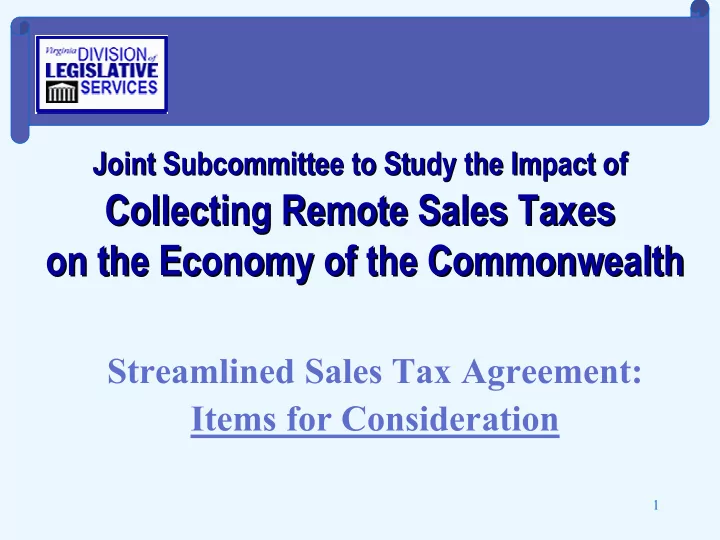

Joint Subcommittee to Study the Impact of Joint Subcommittee to Study the Impact of Collecting Remote Sales Taxes Collecting Remote Sales Taxes on the Economy of the Commonwealth on the Economy of the Commonwealth Streamlined Sales Tax Agreement: Items for Consideration 1
Current Legal Landscape States are prohibited from requiring out-of- • state vendors to collect and remit use tax, Quill Corp. v. North Dakota , (1992). • A vendor who has physical presence can be required to collect the tax (e.g., employees working in the state, place of business in the state, delivery by company-owned trucks). • Persons selling over the Internet, by catalogue, or through the mail, with no physical presence, cannot be required to collect use tax. 2
Streamlined Sales Tax Project • In March of 2000, several states began to meet in an effort to devise a uniform sales and use tax administrative system. • If simplification of the collection of sales and use taxes can be achieved, some out-of-state vendors might voluntarily participate in a multi-state simplification agreement and agree to remit tax on remote sales. 3
Streamlined Sales Tax Project • Forty-two states and the District of Columbia have been meeting to develop a voluntary uniform sales and use tax administrative system. • Virginia’s delegation joined the Streamlined Sales Tax Project (SSTP) in 2002. • There have been efforts at the federal level to enact laws permitting governments to require out-of-state vendors to collect and remit use tax. 4
Streamlined Sales and Use Tax Agreement • The Streamlined Sales and Use Tax Agreement (SSUTA) was approved on November 12, 2002. • The Agreement is effective when at least 10 states comprising at least 20 percent of the population of all states imposing state sales taxes have been found to be in compliance with the Agreement. • Twenty-one states have enacted all or part of the Agreement. Nineteen of these states comprising more than 20 percent of the population are near compliance . 5
Streamlined Sales and Use Tax Agreement: Items for Consideration • This presentation focuses only on issues arising under SSUTA. • SSUTA issues can be categorized as follows: 1. What is substantial compliance. 2. Standards for future sales tax legislation. 3. Annual recertification of compliance. 4. Administrative costs and dealer discounts. 5. Statutory conformance or technical compliance issues. 6
Streamlined Sales and Use Tax Agreement: Items for Consideration Substantial Compliance • A state’s sales and use tax laws have to be in substantial compliance with SSUTA for the state to be eligible to participate in the Agreement. • The governing board makes the initial determination of substantial compliance. Upon acceptance into the Agreement, the chief executive of the state’s tax agency annually re- certifies substantial compliance. • How many straws does it take to break the camel’s back? 7
Streamlined Sales and Use Tax Agreement: Items for Consideration Standards for Future Sales Tax Legislation • Does the legislation move the state out of substantial compliance with the Agreement? • Who will make this determination and when? Will the determination be made contemporaneously with committee hearings on the bill or after the end of the relevant Session? • Procedures may need to be adopted by states participating in the Agreement. • Amendments to SSUTA require a three-fourths vote of the entire governing board. 8
Streamlined Sales and Use Tax Agreement: Items for Consideration Annual Recertification of Compliance • The chief executive of the state’s tax agency annually recertifies substantial compliance. • The chief executive shall include in the recertification any changes in its statutes, rules, regulations, or other authorities that could affect compliance. • The governing board, however, is the final arbiter of substantial compliance. 9
Streamlined Sales and Use Tax Agreement: Items for Consideration Administrative Costs and Dealer Discounts • Administrative costs upon states participating in SSUTA include: 1. Ongoing maintenance of databases of sales and use tax rates and zip codes. 2. Monetary allowances to Certified Services Providers (CSPs). 3. Additional discounts to sellers voluntarily participating in the Agreement. 4. Amnesty to vendors voluntarily registering. 5. Potential expenses of the governing board and staff. 10
Streamlined Sales and Use Tax Agreement: Items for Consideration Administrative Costs and Dealer Discounts • Administrative costs upon vendors voluntarily participating in SSUTA include: Participating vendors may be required 1. to submit sales and use tax returns and remittances electronically. Potential of systems costs. 2. 11
Streamlined Sales and Use Tax Agreement: Items for Consideration Statutory Conformance or Technical Compliance Issues • If Virginia were to conform with SSUTA, the Commonwealth’s laws would have to be amended to address: 1. SSUTA’s sourcing rules conflict with current intrastate sourcing rules. 2. Taxability of freight and handling charges. 3. Sales tax rates on modular buildings and maintenance contracts. 4. Definition of food for sales tax and local meals tax purposes. 12
Recommend
More recommend